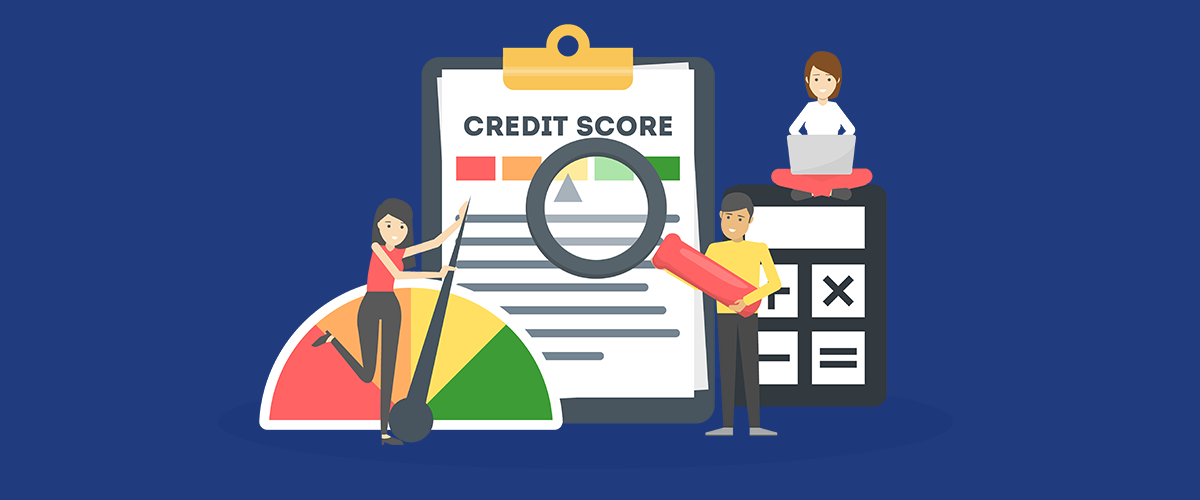-
Personal Loans
- Business Loan
- Gold Loan
-
Credit Cards
- Credit Report
- Login
Products
Personal Loans Business Loan Gold Loan Credit CardsResources
EMI Calculator IFSC Code Blogs FAQs

Products
Personal Loans Business Loan Gold Loan Credit CardsResources
EMI Calculator IFSC Code Blogs FAQsBlogs > 5 Myths About Credit Score and the Truth Behind Them

We live in a world which believes in the mantra of instant gratification. Instant gratification requires money which is also available instantly from many financial organizations, provided you have a good credit score.
What is a credit score? A credit score is a number which ranges in between 300-900. It is calculated by a credit information company. This company also maintains a record of an individual’s loans and credit cards. In India, this job is primarily done by CIBIL or (Credit Information Bureau (India) Limited). If you have a good repayment history and have never defaulted in your life, you are likely to have a good credit score above 750.
Unfortunately, a lot of myth floats around this magic number ‘750’, which often creates misconceptions in people’s minds regarding what helps and hurts their creditworthiness. If you’ve heard — and believed — these myths, it’s quite possible that you may be doing something that could be preventing you from maintaining good credit. That said, let us bust the top five common myth surrounding credit or CIBIL score as it is known in India.
Fact- If you wish to check your credit score, just to know about your financial standing. It is regarded as a soft inquiry and does not have any negative impact on your credit score. However, when a bank or credit institution requests access to your credit score it is regarded as a hard inquiry. Repeated inquiries by banks or financial institution give an impression of credit-hungry behavior which might affect your credit score negatively.
Fact- Contrary to common belief working with hard cash does not have any impact on your credit score either in a positive or negative way. It is because when you do not take any loan or use a credit card you fail to build a credit history. Without having a credit history it becomes impossible for any institution to assess your credit repayment capabilities. Under such circumstances, banks will have to rely only on your income record and demographics. To evaluate your creditworthiness which may not give very accurate results. This can prevent you from getting a loan in times of need. If you use a credit card and have a good transaction history you can not only build good credit history but also take advantage of their reward programs which include cash back, air miles and fuel points.
Fact- A bad credit score is simply a reflection of bad credit behavior and there is no reason to assume that it cannot be rectified at all. If you start repaying your bills on time and do not default on your loan repayment, you can improve your credit score subsequently over a period of time.
Fact- Credit scores like your passport or driving license is unique to each person. This holds true even if you share a common bank account and your finances. However, if you have taken a loan jointly and fail to make monthly repayments. Then the credit score of both the partners will suffer a major setback. However, when the loan is processed in the name of one partner a good or bad loan repayment history is reflected solely on his/her credit score account.
Fact- There is no reason to assume that you will not get any loans if you do not have a perfect score of 750 or more. There are many institutions who will be willing to help you out. However, the rate of interest will be inversely proportional to your credit score. This simply means that the lower your score gets, the higher will be the rate of interest on your loan.
Having a clear idea about credit score is very important to ensure that you act in a financially responsible manner. This goes a long way in helping you maintain a good score. It is important to remember that your credit scores keep changing every month. There is no need to check it on a monthly basis. As long as you take care to pay your debts, the score will automatically take care of itself.
Previous Article: Why You Should Pay with Credit Cards For Online Shopping
IndiaLends is a digital lending and borrowing marketplace that helps you connect with the best lenders based on your credit profile. We provide personalized personal loan offers, best credit cards, and free credit reports.


